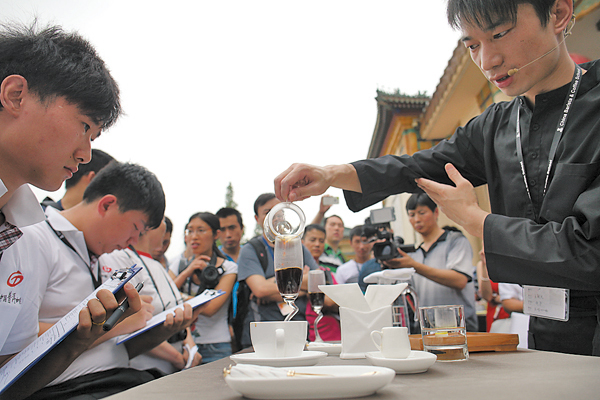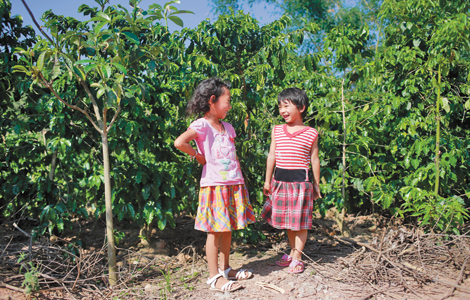Yunnan brews up cups of success
Updated: 2013-06-26 08:41
By Hu Yongqi (China Daily)
|
|||||||||||
|
 |
|
People attend a coffee making contest, entitled the Pu'er Cup in Beijing last week. [Photo by Wang Jing/China Daily] |
Growing the market
Although Pu'er tea is famous throughout China, the city's coffee is still far from popular in the domestic market, according to Lu Han.
In Pu'er, 12 companies collect and hull beans for export. Last year, 24,700 tons of local coffee was exported to Europe and the United States, two-thirds of Pu'er's total output, according to the Coffee Industry Development Office.
Liu Yan, general manager of Simao Arabicasm Coffee Co, said her company exported about 5,000 tons of processed coffee beans to the European Union last year, but admitted the amount is negligible in relation to the global market.
China's total output accounted for less than 1 percent of global output of 8.82 million tons in 2012, meaning domestic growers have no power to determine futures or prices. "Even if China didn't produce a single coffee bean, the global market wouldn't be affected much," said Zhu Zhihong, deputy general manager of Aini Coffee Garden Co, which exported about 3,000 tons of beans last year.
"The local coffee industry relies heavily on demand from other countries, despite the outstanding quality of the beans. Therefore, local people involved in the business are unable to determine the price," said Liu.
Liu's comment was echoed by Jiang Jirong. "The international futures have a seven-year cycle. The highest price was as much as 40 yuan per kg, while the lowest was only 5 or 6 yuan per kg. We have experienced many price fluctuations since 1989," said the farmer.
The price of coffee beans is clearly displayed on a board outside Aini Coffee Garden's factory. The price of coffee beans couldn't be more transparent and manufacturers bought each kg at a price 1 yuan below that quoted on the international futures market, said Zhu.
When the price falls below the cost price of 10 yuan per kg, the farmers lose money, said Shi Youfu. "We are not able to predict demand and the only solution is to find other ways to increase farmers' incomes," he said.
Controversy rose over how to ensure the interests of coffee farmers. "Tea has a relatively stable price, it's about 30 yuan per kg this year, but the price of coffee fluctuates much more - fundamentally, the market decides the price and farmers make a choice between tea and coffee, whichever brings a higher price," said Sheng Jun.
Focus on quality
Chen Xiaoyun, Dakaihe's village head, suggested that the farmers diversify their produce. The area reserved for Pu'er tea has doubled to 60 hectares in the past five years. Meanwhile, tropical nuts were sown between the coffee trees last year, and are expected to bear fruit in five years.
"Our main goal is to maintain a good income for the farmers. The diversified planting structure will help them fight fluctuations in the price of coffee," said Chen.
To avert the risk, the Pu'er city government has a reserve fund of 2 million yuan per year, which it uses to buy coffee beans when the price falls below cost. The provincial and city governments have paid 80 percent of the 22.5 yuan insurance premium for each hectare of coffee trees. If any of the crops are damaged, the farmers receive compensation of 7,500 yuan per hectare.
The Coffee Industry Development Office has prioritized better promotion of local coffee in China, said director Lu. Since June 2012, the office has hosted a dozen events in cities such as Beijing and Shanghai to introduce Pu'er coffee to local VIPs and consumers.
"The next step should be to focus on quality. Jamaica is a good example to follow: The output level is not large, but the unique taste and quality of its Blue Mountain Coffee means it's very popular all over the world," said Liu. "Therefore, Pu'er coffee can win a market by being high quality and unique. Then farmers won't necessarily have to produce huge amounts."
Li Yingqing, Guo Anfei and Peng Yining contributed to this story.
Related Stories
Yunnan cultural trade center opens in Singapore 2013-06-25 17:03
Yunnan promotes tourism in Kuala Lumpur 2013-06-25 17:03
Cross-border RMB settlement surges in Yunnan 2013-06-07 16:59
Communication essential for Yunnan chemical project 2013-05-18 02:01
Increased tourism to Yunnan ahead of Songkran Festival 2013-04-10 17:25
Today's Top News
France wants more Chinese investment
FM: China rejects US' claim on Snowden
Public interests Party's top priority
Overseas sellers upbeat on China
PBOC will act 'if necessary'
4 Chinese killed in Papua New Guinea
'Heavy losses' if China-EU solar sector talks fail
Riots in Xinjiang kill 27
Hot Topics
Lunar probe , China growth forecasts, Emission rules get tougher, China seen through 'colored lens', International board,
Editor's Picks

|

|

|

|

|

|





